Architectural Conservation Training Program at Osmania University College for Women
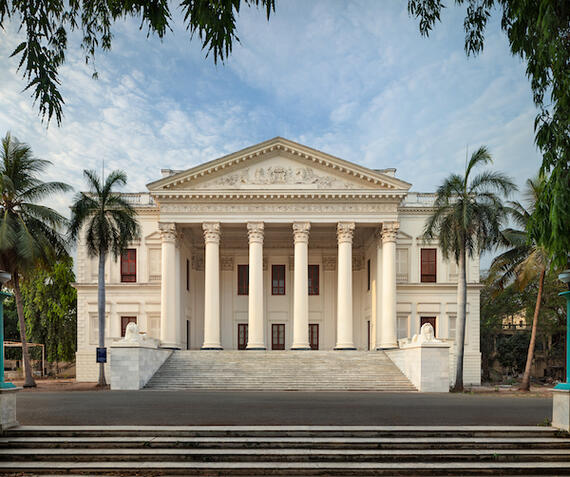
Background
To launch the first overseas initiative of the Queen Elizabeth II Platinum Jubilee Commonwealth Heritage Skills Training Programme, funded by the Hamish Ogston Foundation (HOF), I coordinated a group of six UK trainees selected to participate in an Architectural Conservation Training Program co-organized by World Monuments Fund Britain (WMFB) in Hyderabad, India.
Organized in partnership with the Commonwealth Heritage Forum (CHF), the project focused on building capacity in the practical aspects of built heritage conservation (particularly lime plaster) and sharing knowledge between India and the UK. The trainees were joined by architecture students from Hyderabad.
Based at Osmania University College for Women (formerly the British Residency), the program was part of a 20-year initiative to restore the first institute of higher education for women in the state of Telangana.
Arrival and Familiarization
The trainees disembarked the plane at 6:00 am IST, and by mid-morning they were ascending the steps of the former British Residency. We were warmly welcomed by Sarath Chandra, Principal Conservation Architect of G.N. Heritage Matters, alongside members of his team. Even after a whole afternoon spent learning about the conservation and the people who once lived and worked at the Residency, we only scratched the surface of the history contained within the building and the Begum’s Garden. Luckily, I had packed a copy of White Mughals by William Dalrymple to supplement the day’s lesson.
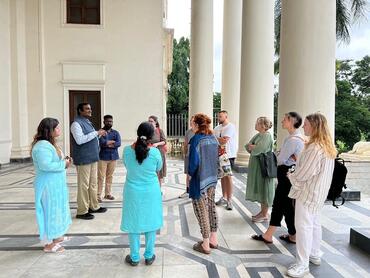
Teaching and Site Visits
The next day, we returned for theory classes led by G.N. Heritage Matters and guest lecturers from across India. The program covered a range of topics, such as the architectural history of South Asia, conservation practices in India, and conservation documentation.
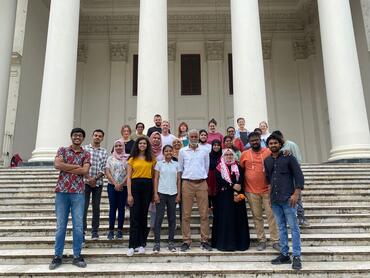
Next, the training moved out of the classroom and into the landscape. Under the supervision of Ravi Gundu Rao, Principal Architect at Ravi Gundu Rao and Associates, trainees received a practical demonstration of how to work with lime, followed by hands-on work. Trainees observed the steps involved in slaking lime and preparing mortar before applying their skills by working on the Residency’s porch. The practical sessions ended with reconstruction work on the jack arch of the Landsdowne Gate, one of three historic gateways restored during the project.
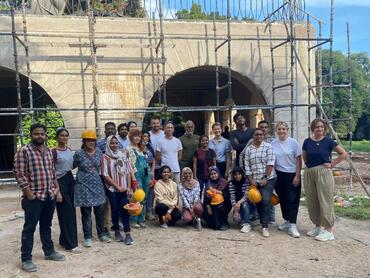
Throughout the program, trainees had the opportunity to experience the practical implementation of their learning through visits to heritage sites across Hyderabad, including Qutub Shahi Tombs, Chowmahalla Palace, and an evening at Falaknuma Palace.
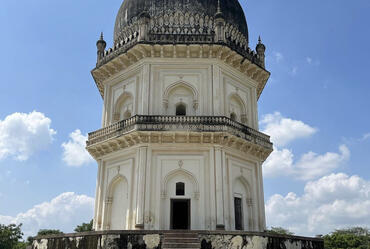
Cultural Experiences
The trainees fully committed to the program and immersed themselves in the culture of India. Every day we experienced incredible food and were met with generous hospitality everywhere we traveled. Wanting to experience as much of Hyderabad as possible, our leisure time was spent seeking out even more cultural activities, such as crossing Hussain Sagar Lake to visit a monumental Buddha Statue there and bargaining at Shilparamam Market.
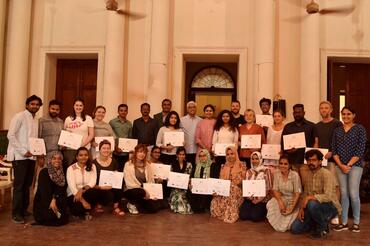
On the last day, trainees were presented with certificates of completion by Dr. Tejaswini Yarlagadda, Chair of the Pleach India Foundation.
The fortnight culminated in a farewell dinner for trainees and the G.N. Heritage Matters team. The next afternoon, as we disembarked from the plane in London, we were already sharing photos with the local students and trainers from the program. This seemingly small act—the swapping of pictures via WhatsApp—in fact testified to how successful the program had been in achieving its goal of building ties of knowledge, experience, and friendship between the UK and India.
Emma Sweeney is Project Manager at WMF Britain. As part of her role at WMF, she is completing a Historic Environment Advice Assistant Apprenticeship (HEAA), developed by Historic England and accredited by the Chartered Institute of Archaeologists (CIfA). Emma completed the Architectural Training Programme alongside the six UK trainees and fellow project coordinator Megan Kirkpatrick, Policy and Communications at CHF.
Learn More
World Monuments Fund safeguards cultural heritage around the globe, ensuring our treasured places are preserved for present and future generations.
Sign up for our newsletter to receive regular updates on our projects, stories from the field, upcoming events, and more!
![]()
